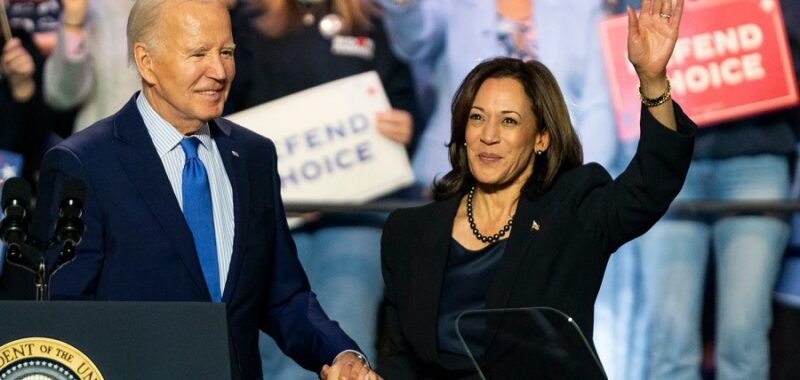
President Biden and Vice President Harris will appear together on Thursday — their most significant joint appearance since she supplanted him as the Democratic nominee.
White House press secretary Karine Jean-Pierre said at Monday’s media briefing that Biden and Harris, traveling the short distance to Prince George’s County in Maryland, would “deliver remarks on the progress they are making to lower costs for the American people.”
Next week, Biden will also appear at the Democratic National Convention for what will surely be a bittersweet occasion for the president. He will be in Chicago to pass the torch rather than to accept the nomination, as he was expected to do up until he was capsized by his catastrophic late June debate with former President Trump.
The Biden appearances this week and next presage a bigger, difficult dance that Harris will have to execute as the clock ticks down toward the election.
She is the first person in almost a quarter-century to be seeking the presidency while also serving as vice president. But unlike her precursor in that regard — Vice President Al Gore, who was the Democratic nominee in 2000 — she doesn’t have the advantage of a popular boss providing a political tailwind.
Biden has mediocre approval ratings and problems with centrist voters on key issues including the economy and immigration. He has a whole other difficulty with the Democratic base on Israel and Gaza.
There is also the question of just how much appetite Democratic voters have to see Biden play a big role on the campaign trail.
The harsh reality is that Harris is only the nominee in the first place because Biden’s debate performance was so bad that Democrats concluded they had no real chance of victory with him as the nominee. Specifically, the clash created a whole new level of concern around Biden’s cognitive capabilities.
It’s hard to identify any part of the Democratic coalition that would be especially revved up by a Biden appearance. Even on his best days, he has never electrified the base in the same way as former President Obama, for example.
So, for Harris, her campaign and the White House, there is a tricky knot of questions: How can Biden be used on the campaign trail? How does the vice president keep her distance from him without appearing disloyal? And how does she outline her own distinct policy agenda without appearing to be in open disagreement with the president whom she continues to serve?
The last dilemma has already made itself felt.
Harris abruptly announced her support for ending taxes on tips for hospitality and service workers during a speech in Las Vegas last weekend. The move, copying a similar proposal from Trump, then sparked questions to the White House about whether Biden supported the move (the answer: yes); and, if so, why hadn’t he proposed it himself during the previous three years.
There are optics to manage, as well. It remains unclear whether Biden will still be at the Democratic National Convention next Thursday night when Harris delivers her key speech accepting the nomination. Jean-Pierre declined to weigh in on that issue at Monday’s briefing.
Some Democrats argue that there are elements of Biden’s record that Harris can embrace.
They note the president’s big legislative accomplishments, including the infrastructure bill and the Inflation Reduction Act, as well as the elements within such measures that are most obviously of concrete benefit to people’s lives.
The example most often cited is the capping of insulin costs at $35 per month for seniors on Medicare.
Democratic strategist Mark Longabaugh argued the Biden record would give Harris something to run on, while also leaving room for her to put forth her own plans. The Biden-Harris administration’s progress “provides her a pivot point to frame this as an election about the future,” he said.
Longabaugh also contended that Harris had a big advantage in simply being able to repurpose Biden’s campaign staff and funds for her own purposes — rather than starting from scratch, as could have potentially been the case for any other Democratic nominee.
“He has already handed her a tremendous political operation,” Longabaugh said, adding that it was a “huge asset to be able to just insert that political team and campaign infrastructure.”
Still, other Democrats have concerns over Harris getting overly closely shackled to Biden.
In the polling average maintained by FiveThirtyEight, just 39 percent of Americans approve of Biden’s job performance while almost 56 percent disapprove. In the latest Economist/YouGov poll, released last week, only 40 percent approved of his handling of jobs and the economy. On immigration, that figure fell to just 33 percent.
Republicans, tellingly, say they would relish more campaign trail appearances from Biden. But they acknowledge this seems unlikely to happen.
“I think that Biden will be used in a very, very limited way,” said Matt Mackowiak, a GOP strategist and the chairman of the Travis County, Texas, Republican Party.
“I think the risks of his involvement are pretty high. It’s not simply him being off-message or having an episode, it’s that he’s also a reminder of the unusual way she was selected to be the nominee. While his unpopularity is his — not hers — he still drags her down.”
Biden, a proud man, won’t want to end his presidency with a whimper.
But even Republicans like Mackowiak don’t expect to see much of him on the campaign trail.
“I don’t think he will be totally invisible,” the GOP strategist predicted. “But I think he will be the least-utilized president of the modern era.”
The Memo is a reported column by Niall Stanage.

